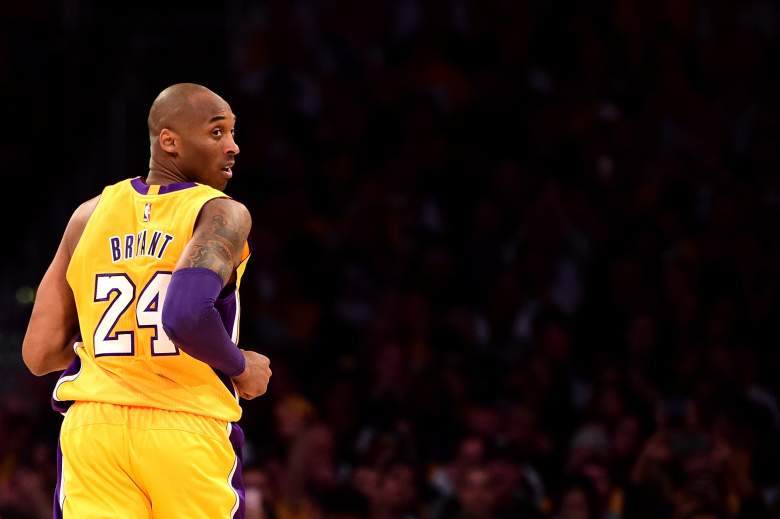
LOS ANGELES, CA - APRIL 13: Kobe Bryant #24 of the Los Angeles Lakers looks back in the first half while taking on the Utah Jazz at Staples Center on April 13, 2016 in Los Angeles, California. NOTE TO USER: User expressly acknowledges and agrees that, by downloading and or using this photograph, User is consenting to the terms and conditions of the Getty Images License Agreement. (Photo by Harry How/Getty Images)
NBA legend, Kobe Bryant and his daughter, Gigi died in a helicopter accident along with seven passengers on January 26, 2020 in Calabasas, California.
Bryant, the 13th pick in the 1996 NBA Draft from Lower Merion High School won five NBA Championships with the Los Angeles Lakers, had his No. 8 and No. 24 jerseys retired by the purple an gold and is the NBA’s fourth all-time scorer.
Bryant’s loss was reported in a different way. News of the crash was broken by TMZ before Bryant’s family was notified.
Since Bryant’s crash and death, recent reports have stated that photos of the helicopter crash site in Calabasas were taken and exchanged amongst people working on the crash scene.
On last week’s episode of the Scoop B Radio Podcast, Fred Mwangaguhungahe, founder of Mediatakeout.com discussed the legalities and ethics of TMZ reporting Bryant’s death at such a rapid rate.
Check out our Q&A Below:
Brandon ‘Scoop B’ Robinson: Help me understand something as an NBA writer like myself. TMZ broke the story of Kobe Bryant’s helicopter accident back in January. A tragic event. From your perspective and your expertise, would MediaTake Out ever run something like that the way they did if you had the information in there?
Fred Mwangaguhunga: I don’t know. And I think some people would say, ‘of course you would’. But we sat on stories, big stories – we do that often. And I think the idea behind that is, you really don’t – and this theme you’re probably going to see throughout this interview… that the number one most important thing to us is to please our audience. And sometimes pleasing your audience is getting the stories as quickly as possible. But sometimes there are certain stories that your audience might NOT want from you as quickly as possible. You know, they might be a second there be like, I’m grateful for this news, but after they finish reading the story and after they got the news. You might leave them with a really bad taste in the mouth, and I think that’s the case with the Kobe Bryant story. Yes it was a big news story to break. Yes it probably got a lot of traffic. But after the traffic bump is over, what are audiences thinking about your company? Do they still feel good about logging on every morning and reading you? And I think in that case, I think there’s a lot of people that reading the story, and reading how they did it, breaking the new story before members of Kobe’s own family knew about it, putting it out there, I think a lot of people just don’t feel good about the way that story was reported. And I think in the end if you add up the big traffic bump that they got, and you add up probably the large amount of people that are going to be unsubscribing from TMZ, because they just don’t like the way it was handled. I think if you balance that out, I think even they would probably say that wasn’t the right way to report the story
Brandon ‘Scoop B’ Robinson: I feel like that’s the intersection between journalism, law, and gossip. And there’s even a level to gossip particularly because Kobe was so beloved by basketball fans, people that were in Los Angeles, and I think that the way that both he and his daughter died with seven other people in a helicopter like, it left a bad taste in people’s mouths.
Fred Mwangaguhunga: Right. I mean there were other ways you could have reported it. They could’ve just started out: A HELICOPTER CRASH. BELIEVED TO BE A CELEBRITY ON BOARD… and I think that would have gotten a large number of people to look at it anyway and then after they realized when they were certain that Kobe’s family found out about and everything else, then if they reported it after, I think everybody would’ve been happy with the reporting. They would’ve said, ‘Wow! TMZ did a really good job in reporting this.’ But by doing it the way that they did, they erased all of the goodwill that they would have gotten for breaking a big story. When you break a big story, you get two things. One: you get a traffic bump. You get a bunch of new people that are visiting your site and you can advertise, or whatever. So that’s part one. Usually for most digital media people, that’s not as important as the second piece. The second piece that you get is your gaining good will from your readership. Your readers are saying, ‘Hey, this is the kind of place that breaks the stories quicker than everybody else, but have all the facts, they’re putting it all together in a way that I like, and so I wanna include – you know, there’s thousands of different websites out there. There are tons of social media platforms. But I’m going to make sure this one place that I visit frequently. And that’s what you want to do when you’re breaking a big story. That’s the most important thing to breaking a big story. Now like I said, I don’t know if they got that. They got the first piece which was the traffic bump. But they didn’t get the second piece. Like I said, most digital media people will say that’s the more important piece of it.